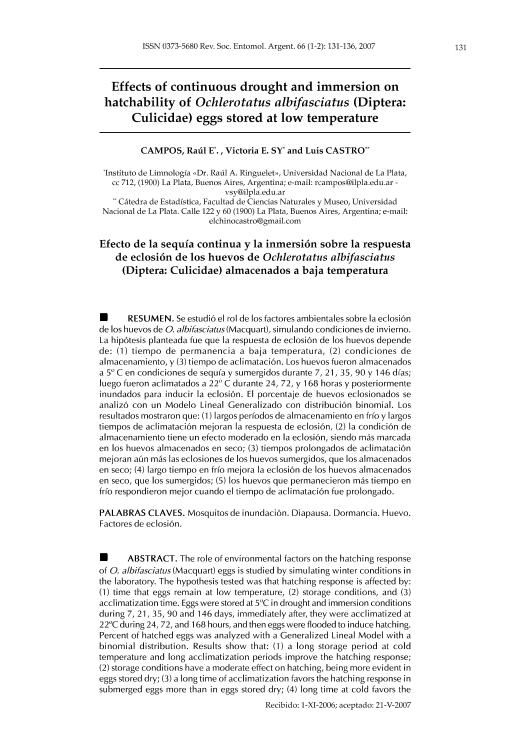Mostrar el registro sencillo del ítem
dc.contributor.author
Sy, Victoria Elena

dc.contributor.author
Campos, Raul Ernesto

dc.contributor.author
Castro, Luis Eduardo

dc.date.available
2017-12-15T17:21:46Z
dc.date.issued
2007-05
dc.identifier.citation
Castro, Luis Eduardo; Campos, Raul Ernesto; Sy, Victoria Elena; Effects of continuous drought and immersion on hatchability of Ochlerotatus albifasciatus (Diptera: Culicidae) eggs stored at low temperature; Sociedad Entomológica Argentina; Revista de la Sociedad Entomológica Argentina; 66; 1-2; 5-2007; 131-136
dc.identifier.issn
0373-5680
dc.identifier.uri
http://hdl.handle.net/11336/30760
dc.description.abstract
Se estudió el rol de los factores ambientales sobre la eclosión de los huevos de O. albifasciatus (Macquart), simulando condiciones de invierno. La hipótesis planteada fue que la respuesta de eclosión de los huevos depende de: (1) tiempo de permanencia a baja temperatura, (2) condiciones de almacenamiento, y (3) tiempo de aclimatación. Los huevos fueron almacenados a 5º C en condiciones de sequía y sumergidos durante 7, 21, 35, 90 y 146 días; luego fueron aclimatados a 22º C durante 24, 72, y 168 horas y posteriormente inundados para inducir la eclosión. El porcentaje de huevos eclosionados se analizó con un Modelo Lineal Generalizado con distribución binomial. Los resultados mostraron que: (1) largos períodos de almacenamiento en frío y largos tiempos de aclimatación mejoran la respuesta de eclosión, (2) la condición de almacenamiento tiene un efecto moderado en la eclosión, siendo más marcada en los huevos almacenados en seco; (3) tiempos prolongados de aclimatación mejoran aún más las eclosiones de los huevos sumergidos, que los almacenados en seco; (4) largo tiempo en frío mejora la eclosión de los huevos almacenados en seco, que los sumergidos; (5) los huevos que permanecieron más tiempo en frío respondieron mejor cuando el tiempo de aclimatación fue prolongado.
dc.description.abstract
The role of environmental factors on the hatching response of O. albifasciatus (Macquart) eggs is studied by simulating winter conditions in the laboratory. The hypothesis tested was that hatching response is affected by: (1) time that eggs remain at low temperature, (2) storage conditions, and (3) acclimatization time. Eggs were stored at 5ºC in drought and immersion conditions during 7, 21, 35, 90 and 146 days, immediately after, they were acclimatized at 22ºC during 24, 72, and 168 hours, and then eggs were flooded to induce hatching. Percent of hatched eggs was analyzed with a Generalized Lineal Model with a binomial distribution. Results show that: (1) a long storage period at cold temperature and long acclimatization periods improve the hatching response; (2) storage conditions have a moderate effect on hatching, being more evident in eggs stored dry; (3) a long time of acclimatization favors the hatching response in submerged eggs more than in eggs stored dry; (4) long time at cold favors the hatching response in eggs stored dry more than in submerged eggs; (5) the hatching response of eggs that remain for a long time at low temperature is higher when the time of acclimatization is long.
dc.format
application/pdf
dc.language.iso
eng
dc.publisher
Sociedad Entomológica Argentina

dc.rights
info:eu-repo/semantics/openAccess
dc.rights.uri
https://creativecommons.org/licenses/by-nc-sa/2.5/ar/
dc.subject
Mosquitos de Inundación
dc.subject
Diapausa
dc.subject
Dormancia
dc.subject
Factores de Eclosión
dc.subject
Huevo
dc.subject.classification
Otras Ciencias Biológicas

dc.subject.classification
Ciencias Biológicas

dc.subject.classification
CIENCIAS NATURALES Y EXACTAS

dc.title
Effects of continuous drought and immersion on hatchability of Ochlerotatus albifasciatus (Diptera: Culicidae) eggs stored at low temperature
dc.title
Efecto de la sequía continua y la inmersión sobre la respuesta de eclosión de los huevos de Ochlerotatus albifasciatus (Diptera: Culicidae) almacenados a baja temperatura
dc.type
info:eu-repo/semantics/article
dc.type
info:ar-repo/semantics/artículo
dc.type
info:eu-repo/semantics/publishedVersion
dc.date.updated
2017-10-30T18:58:25Z
dc.journal.volume
66
dc.journal.number
1-2
dc.journal.pagination
131-136
dc.journal.pais
Argentina

dc.journal.ciudad
Mendoza
dc.description.fil
Fil: Sy, Victoria Elena. Consejo Nacional de Investigaciones Científicas y Técnicas. Centro Científico Tecnológico Conicet - La Plata. Instituto de Limnología ; Argentina
dc.description.fil
Fil: Campos, Raul Ernesto. Consejo Nacional de Investigaciones Científicas y Técnicas. Centro Científico Tecnológico Conicet - La Plata. Instituto de Limnología ; Argentina
dc.description.fil
Fil: Castro, Luis Eduardo. Universidad Nacional de La Plata. Facultad de Ciencias Naturales y Museo; Argentina. Consejo Nacional de Investigaciones Científicas y Técnicas; Argentina
dc.journal.title
Revista de la Sociedad Entomológica Argentina

dc.relation.alternativeid
info:eu-repo/semantics/altIdentifier/url/http://ref.scielo.org/s63s89
Archivos asociados
